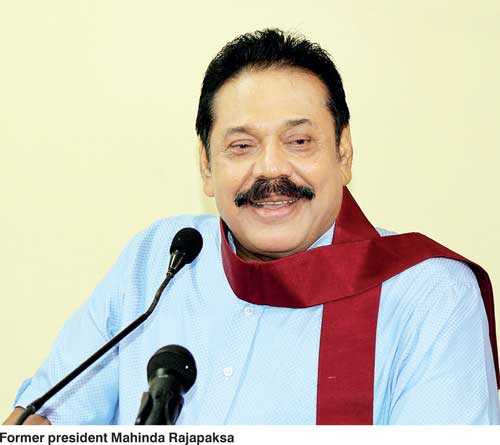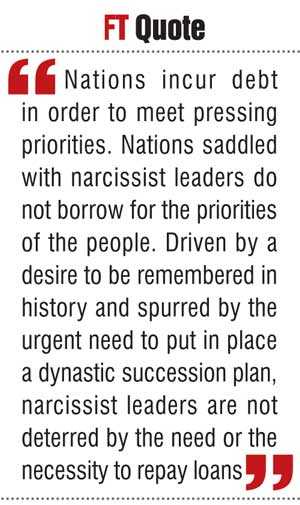Tuesday Feb 17, 2026
Tuesday Feb 17, 2026
Monday, 9 July 2018 00:00 - - {{hitsCtrl.values.hits}}
The distilled essence of the New York Times story was in the phrase ‘Cough up a port’ in the headline.
The caption compacted the global perception of the Magampura Mahinda Rajapaksa Port and its progression to date, into the finite space of the simple phrase – Sri Lanka coughed up a port to China.
The ‘cough’ metaphor made Mahinda Rajapaksa acolytes puke an unbelievable quantity of vitriol and venom at two Sri Lankan journalists who professionally assisted the NYT journalist to carry out her assignment in the form of logistical support and background material.

Reasonable minds are baffled by the incendiary indignation and obsessional opprobrium manufactured and vented out by the former president and his substantial support base.
The Rajapaksa corporate megalith has no patience with a vibrant free press. Brother Gotabaya demonstrated how the press can be tamed. He took The Sunday Leader to court. The litigation dragged on until the publisher was forced to sell the outfit that was being sued for billions in damages. The investor ready to take over the paper that was stubbornly critical of the Rajapakse regime was a close confidante of the ruling family. The editor of the paper, who opted to serve under the new management did not last long. After a telephone spat with the Defense Secretary over the airlifting of a puppy from Switzerland, the luckless lady decided on voluntary exile.
The reader should remember that in those days, the law was applied either swiftly or slowly. It depended on which side of the Rajapaksa corporate megalith you stood.
The beleaguered publisher sold out to a party which was confident of reaching a settlement with the plaintiff – the once all-powerful Defence Secretary. Then, something unexpected happened. ‘Conspiring Western powers persuaded the people’ to vote out Mahinda. Meanwhile, the new publisher fired the legal counsel who was subjecting the plaintiff to rigorous cross examination. The plaintiff decided to be reasonable. Instead of the billions demanded, a settlement was reached. The paper published a no-holds-barred apology to Gotabaya Rajapaksa, which sacrilegiously also admitted that the story so painstakingly researched, investigated and written by Lasantha Wickrematunge’s editorial team, was baseless. The Sinhala dictum – ‘Naduth Hamuduruwange, Baduth Hamuduruwange’ entered our legal lore.
It bears mention that the defamation case in question was filed over Wickrematunge’s consistent exposes with regard to the controversial purchase of MiG-27 ground attack aircraft for the Sri Lanka Air Force. An FCID investigation into this same transaction has delivered an Interpol Red Notice on former President Rajapaksa’s nephew Udyanga Weeratunga and forced the former Defence Secretary to make an appeal in the Supreme Court to prevent his arrest in connection with the case.
Twelve years ago, Lasantha Wickrematunge conducted his own investigation into the transaction, filing away hundreds of Government documents to substantiate the facts he published in his newspaper.
Fast forward to 2018. In respect to the allegations made by the New York Times, the former president has decided to seek redress in Sri Lanka. Addressing a gathering at a Buddhist temple, he blamed the local journalists and announced that he would institute legal proceedings against publications that reproduced the NYT story about the port that was coughed up.
Mahinda is the arch realist. Litigating in New York is a different ball game. He has access to expert advice in the shape of brothers Basil and Gotabaya. Both are well acquainted with constitutional and legal order in the US. They have passed the written and oral tests on the subject conducted by the INS - the Immigration and Naturalization Service of the United States. Mahinda is truly fortunate. He has the combined wisdom of the hands-on knowledge of his two brothers plus the remote wisdom of Prof. G.L. Pieris.
In the natural order of global commerce, creditors exercise better bargaining power than debtors who are hocked up to their throats, chins and noses.
Nations incur debt in order to meet pressing priorities. Nations saddled with narcissist leaders do not borrow for the priorities of the people. Driven by a desire to be remembered in history and spurred by the urgent need to put in place a dynastic succession plan, narcissist leaders are not deterred by the need or the necessity to repay loans. They mislead themselves by the illusory hope that creditors will be circumspect in their demands or be dazzled and deceived by declarations of good intent as they do with their captive people.

Kyauk Pyu port
The Indians refused to help build the Magampura Port on the grounds of its feasibility. The Chinese obliged on specified terms and conditions of repayment. Sri Lanka wanted the port at Hambantota. D.A. Rajapaksa had mooted the proposal in the State Council. His son the President of Sri Lanka wanted it commissioned on his 65th birthday.
The Chinese too wanted a modem port outside its immediate borders in the south. The Middle Kingdom formulates its strategies in terms of decades and centuries. The Chinese had on their drawing boards, plans for a deep-sea port in Kyauk Pyu in the Rakhine Province of Myanmar. They were quietly wooing the ruling junta, and later the reluctantly democratic khaki outfit that succeeded it. Kyauk Pyu port was a win-win for both Myanmar and China.
When Sri Lanka wanted funds for Hambantota, the Chinese found it to be a good game of poker for a port. Viyathmaga academics and professionals should seriously take up maritime geography.
When completed, the $ 7.3 billion deep water port will also host a $ 2.7 billion industrial zone that opens into the Bay of Bengal. It will have two parallel pipelines carrying oil and natural gas to the Yunnan Province of China. The Kyauk Pyu port when fully commissioned will naturally impact the performance of the Port in Hambantota. It may impact Trincomalee as well.
The NYT correspondent Maria Abi-Habib cites the positive response of the Chinese to Sri Lanka’s request for funds to build a port, an example of China’s ambitious use of loans and aid to gain influence around the world — and of its willingness to play hardball to collect. The Chinese knew the kind of pseudo experts and policymakers they were dealing with. Soon after the inauguration of the Port, the Lankan Ports Authority quoted the Singaporean Ambassador. The Singapore Ambassador in Sri Lanka is supposed to have said after touring the Port in Hambantota, “We’d better find ourselves another job. Sri Lanka being at the very epicentre of trade routes will be able to accommodate even the largest of ships and cater to their needs.”
In the hands of sycophants of exceptional genius, Mahinda Rajapaksa was the emperor permanently ensconced in the dressing room trying out new robes.
Maria Abi-Habib‘s conclusion and summing up are eminently precise and deadly accurate. She explains, “Months of interviews with Sri Lankan, Indian, Chinese and Western officials and analysis of documents and agreements stemming from the port project present a stark illustration of how China and the companies under its control ensured their interests in a small country hungry for financing.”
She does not suggest that the Magampura Mahinda Rajapaksa Port has been turned into a Chinese military outpost. What she describes is the perception of sceptical neighbours.
“Indian officials, in particular, fear that Sri Lanka is struggling so much that the Chinese Government may be able to dangle debt relief in exchange for its military’s use.”
Prime Minister Ranil Wickremesinghe has reacted to the NYT article. The Chinese government, he assures us “never pressurised Sri Lanka on this matter. What the Chinese government wanted us to do was to get proposals from Chinese companies to come up with proposals to run the port initially. The proposal from China Merchant Ports (CM Ports) was most beneficial for Sri Lanka.”

CM Ports has agreed to invest $ 1.08 billion in the port. The Chinese Company and the Sri Lanka Ports Authority have entered into an agreement after the proposal received Cabinet approval. “This is a victory as far as the people in this country are concerned,” says the Prime Minister.
Thucydidean wisdom
The spin on the ‘victory’ aspect of the Port deal requires some comment. It becomes compulsory in the context of the doctrine of public trust and the principle of transparency held high by this government as opposed to the governance style of the Son of Hambantota. Dealing with Contemporary China is neither feasible nor possible without knowing the Thucydidean wisdom contained in the Melian dialogues. The great, vibrant, determined and sprawling land mass of China with its authoritarian market economy is classical Athens when dealing with small nations as was learnt by ‘Sparta’ in the Greek wars of antiquity.
The Athenians told Sparta, “What is practical and desired by the powerful is moral. The powerful extract what they can and the weak grant what they must.”
The Athenians only had to demonstrate that Sparta’s surrender was the only option. Therefore, it would be the correct and proper decision. The Prime Minster would have served us better if he admitted the Thucydidean option that was available to us after all the politicking about China and our overwhelming national debt.
The NYT story unfolds a subplot that is incidental to the main thesis on coughing up a port. That seems to have irked the former President. It should not. It does not speak about any wrongdoing or offence committed. Sri Lanka does not have laws guiding campaign financing as in the United States.
The article states that during Sri Lankan elections in 2015 “large payments from the Chinese port construction fund” flowed directly to campaign aides and activities for Mr. Rajapaksa and that these payments “were confirmed by documents and cash checks detailed in a government investigation” seen by The New York Times. She does not claim that she alone saw the documentary evidence.
She is explicit in her assertion that the newspaper has seen the evidence. The New York Times once defied the President and the Executive branch in the US by publishing the ‘Pentagon papers’, an action which was upheld by the US Supreme Court in an unprecedented unanimous decision that became a landmark precedent in democracies worldwide. Obviously, brother Gotabaya has missed out and brother Basil has learnt about a free press.
The article states: “At least $ 7.6 million was dispensed from China Harbor’s account at Standard Chartered Bank to affiliates of Mr. Rajapaksa’s campaign, according to a document, seen by The Times, from an active internal government investigation.
“The document details China Harbor’s bank account number — ownership of which was verified — and intelligence gleaned from questioning of the people to whom the cheques were made out.”
Most of the payments were from a subaccount controlled by China Harbor, named ‘HPDP Phase 2’, shorthand for Hambantota Port Development Project.
China Harbor has paid out. The people who received are known to the New York Times. The editors have told the former president that they are willing to clarify and explain. Who knows? It is possible that the New York Times is wrong. Our liberator could take the New York Times to the dry cleaners in a US court for slander and defamation. He could do better than his brother at the Mount Lavinia District Court against The Sunday Leader.